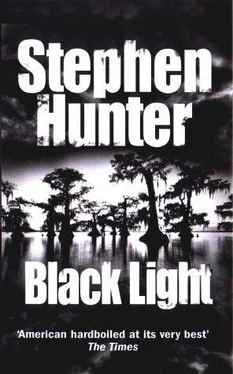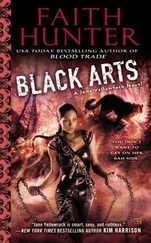Stephen Hunter - Black Light
Здесь есть возможность читать онлайн «Stephen Hunter - Black Light» весь текст электронной книги совершенно бесплатно (целиком полную версию без сокращений). В некоторых случаях можно слушать аудио, скачать через торрент в формате fb2 и присутствует краткое содержание. Год выпуска: 1996, ISBN: 1996, Издательство: Island Books, Жанр: Триллер, на английском языке. Описание произведения, (предисловие) а так же отзывы посетителей доступны на портале библиотеки ЛибКат.
- Название:Black Light
- Автор:
- Издательство:Island Books
- Жанр:
- Год:1996
- ISBN:0-385-48042-3
- Рейтинг книги:3 / 5. Голосов: 1
-
Избранное:Добавить в избранное
- Отзывы:
-
Ваша оценка:
- 60
- 1
- 2
- 3
- 4
- 5
Black Light: краткое содержание, описание и аннотация
Предлагаем к чтению аннотацию, описание, краткое содержание или предисловие (зависит от того, что написал сам автор книги «Black Light»). Если вы не нашли необходимую информацию о книге — напишите в комментариях, мы постараемся отыскать её.
Black Light — читать онлайн бесплатно полную книгу (весь текст) целиком
Ниже представлен текст книги, разбитый по страницам. Система сохранения места последней прочитанной страницы, позволяет с удобством читать онлайн бесплатно книгу «Black Light», без необходимости каждый раз заново искать на чём Вы остановились. Поставьте закладку, и сможете в любой момент перейти на страницу, на которой закончили чтение.
Интервал:
Закладка:
Parker!
He held the Shirelle Parker file in his hand. It was quite thin, not much to show for such a horrible crime, though it had been an open-and-shut case.
Why was this important?
Yes, Earl’s last case. That day: July 23, 1955.
He opened the file and a picture greeted him: Shirelle at her eighth-grade graduation. He remembered some policeman had given it to him before the trial. He looked at it now and saw such a pretty girl, her eyes so lit up and full of hope. She was a colored child in the Arkansas of the fifties and she was full of hope! Now, wasn’t that something! She must have been a wonderful child, but he realized he had no evidence about her. He knew nothing about her, except the facts of the death, which are all that matter to a prosecutor. It doesn’t matter if they’re good, bad, wonderful or evil: if they’ve been killed you try and put the killers in the chair or at least in the house.
The next picture was more familiar. It was marked POLK COUNTY SHERIFF’S DEPARTMENT PROPERTY, JULY 24, 1955—EVIDENCE. The crime scene. Shirelle, on her back on the hard shale wash of the hillside, her dress up, her privates violated, her face still and swollen, her eyes wide.
He put the photo down. He could not look at it.
I got him for you, Shirelle , he thought. Yes, I did. I got him for you and Earl. That was my job .
He remembered. It was so easy.
He’d gotten to the scene late the day after, having been devoured by the terrible mess of Earl Swagger’s death in the cornfield, by the grief and the rage and all the long and terrible ceremonies to go through.
Now, finally, at 4:00 P.M. on the twenty-fourth he arrived at Shirelle’s site. He could see in an instant that it had been hopelessly contaminated. Footprints scalloped the ground around her, the litter of candy bar wrappers and pop bottles lay everywhere, one lazy Polk County sheriff’s deputy lounged under a tree, smoking a cigarette.
“Has the state police forensics team been here?” Sam demanded.
“No sir. They ain’t a-coming, I hear. Too busy with Mr. Earl.”
Sam shook his head, but realized it didn’t really matter. There was no evidence left to be gotten here.
“It looks like the goddamned army’s been here.”
“Well, folks heard about the dead nigger gal. They come to look. I tried to keep ’em away but you know how word git around.”
This enraged Sam but he saw the pointlessness of exploding at this dim fool. Instead, seething, he walked to the body. By now Shirelle was gray in color, almost dusty. Her negritude had all but vanished. She was simply a dead child, puffed up with gas that almost took her humanity away.
“You heard about the pocket?” the deputy asked.
Sam hadn’t.
“Earl done found it yesterday, put it in an envelope for Lem to give the state police boys, but when they done never showed, he gave it to the Sheriff’s Office.”
“Pocket?”
“I hear. Ripped from a shirt. Monogrammed. Said RGF on it, pretty as you please.”
Amazing, thought Sam. He’d been investigating and prosecuting murder for thirty years, with five years off for the war, and he’d never come across anything so lucky. But murder was like that: it defied rational explanation and was full of crazy things, coincidences, freaks of happening, the sheer play of the irrational in the universe. A Baptist, he hated murder because it always made him doubt God’s wisdom and even, if he pressed too hard, God’s existence, though he would never utter such heresy.
“I’m going to call the coroner,” he told the deputy. “It’s time to git this poor little girl out of here. Now, you listen to me, you see anybody else pulling up for a free look at the show, you chase ’em goddamn away, you understand? I don’t want to hear about people coming up here no more. It ain’t right.”
“Sam, she’s only a nigger gal.”
Sam turned away.
By the time he got back, the raiding party was already to go. Five sheriff’s deputies with shotguns and rifles and clubs, the sheriff himself already to lead the outfit in search of glory and headlines.
“No,” Sam told them. “Not yet. You boys can be cowboys later.”
But the evidence was undeniable. A quick scan of tax records in the County Clerk’s Office, happily segregated by color, had turned up but one Negro with the initials RGF. His name was Reggie Gerard Fuller, he was eighteen and the second son of Davidson Fuller, the most prosperous Negro in town and owner of Fuller’s Funeral Parlor, which buried all the Negroes. Reggie had a driver’s license on record, and access to an automobile, the hearse, or more likely one of the two smaller black Fords the parlor used to transport mourners. On top of that, Reggie was known as a sharp dresser: his shirts were monogrammed.
High school records indicated that Reggie was a studious though not overbright boy who placidly accepted that he would work for his father in some clerical capacity, lacking the grit and smarts to take over the business himself. He had no incidents on his record, but he was, after all, colored and young, and therefore by inclination more inclined toward deviant behavior. Most sensible people realized that in each Nigra there lurked the secret potential of the rapist and the killer; it had merely to be brought out by liquor or jealousy and knives would flash. The deputies even had a name for the crimes such behavior inspired: they were called “Willie-thumped-Willies” as in, “Oh, hey, I hear you caught a Willie-thumped-Willie the other night.” “Yeah, goddamned coon cut up his old lady with a whiskey bottle. Bitch died before the goddamn ambulance came. I don’t blame the ambulance. I wouldn’t go down there for nothing.” In this one Reggie thumped Shirelle.
But Sam was a stickler. After examining the evidence, he personally called Judge Harrison and personally drove the eighteen miles out to the judge’s farm to get the search warrant and the probable-cause warrant signed.
“This ain’t goddamn Mississippi,” he said. “Or goddamned Alabam. We do things by the law here.”
And he went along on the raid. He knew his presence would considerably lessen the thunder and the fury of the event; white deputies kicking down black doors in the middle of the night, no, not in his county.
So instead of kicking in doors, the deputies waited outside while Sam and the sheriff knocked on the door of the biggest, whitest house in what was called Niggertown but was actually a six-block-square neighborhood in west Blue Eye.
It was four in the morning. Groggily, Mr. Fuller opened the door with a shotgun in his hand and Sam was glad he had come along; the deputies might have opened fire.
“Mr. Fuller, I am Sam Vincent, Polk County prosecutor, and I think you recognize the sheriff.”
Automatic race fear came upon the man’s face: he saw stern whites in his doorway, and behind them, parked at the curb, four police cars, light bars flashing.
“What is this about?”
“Sir, we’ve come to question your son Reggie. And to serve papers on a search warrant. I’ve instructed the boys to be courteous and professional. But we do have an investigation to run. Could you please bring Reggie down to us? Say, the living room?”
“What is—”
“Mr. Fuller, I know you’ve heard, there was another terrible crime yesterday. One of your own kind. Now, we have an investigation to run.”
“My boy didn’t do nothing,” said Mr. Fuller.
“You know me to be a fair man, and I swear to you nothing will happen here tonight or any night except what the law decrees. That’s how I run things. But we have our duty to do. In the meantime, the deputies will search the house. I have a legal paper here which says it’s all right. The deputies won’t break anything and if they do, they’ll pay for it out of their own pockets. But we have to do what we have to do.”
Читать дальшеИнтервал:
Закладка:
Похожие книги на «Black Light»
Представляем Вашему вниманию похожие книги на «Black Light» списком для выбора. Мы отобрали схожую по названию и смыслу литературу в надежде предоставить читателям больше вариантов отыскать новые, интересные, ещё непрочитанные произведения.
Обсуждение, отзывы о книге «Black Light» и просто собственные мнения читателей. Оставьте ваши комментарии, напишите, что Вы думаете о произведении, его смысле или главных героях. Укажите что конкретно понравилось, а что нет, и почему Вы так считаете.












